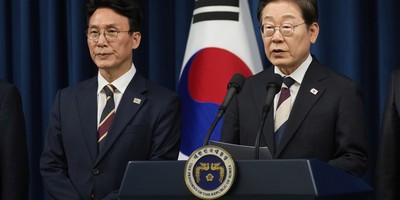The bilked have provided numerous sound bites denouncing Bernie Madoff as "evil," a word whose true meaning is sometimes difficult to grasp in our "nonjudgmental" age.

The definition of evil can be imprecise. Dictionary.com makes a run at it: "morally wrong or bad." According to whom and according to what? Is evil something we see only in others when we define it according to our subjective standards, or is it so embedded in each of us that we work overtime to hide it, not only from ourselves, but from everyone else?
Here is the dirty secret about the Madoff tragedy. Madoff is us. Yes, he is. Do not throw down your newspaper in disgust. We are all potential members of "Swindler's List." Do you know why our gut reaction is so strong and so hostile to Bernard Madoff ("I hope he rots in jail," said one of his "victims")? It is because he mirrors the flaw in each of us. We instinctively react to such people because they strip away our facade and reveal what theologians used to call "sin," before we became "dysfunctional" and in need of medication, not salvation. In extreme circumstances, we have crucified people who exposed our darkness to the light.
"It takes two to tango," my mother used to say when someone's affair was exposed. Madoff could not have prospered without willing participants. People who otherwise exhibited intelligence in their business and personal affairs were seduced by the old get-rich-quick scheme that has suckered humanity for millennia.
Everyone knows, don't they, that a guaranteed return on such investments is impossible? Everyone knows, don't they, that financial reports, with no audits or oversight, and coming from the one with whom you have invested, is a prescription for fraud? And yet the partners in this "tango" were all too happy to dance because their leading man held them tightly and played music they loved to hear. But Madoff's crimes cut doubly deep because he robbed his own.
Recommended
"No one since Julius Rosenberg has so damaged the image and self-respect of American Jews," said Mort Zuckerman, who runs a charitable trust that lost $30 million to Madoff.
"It really is a shame we Jews don't believe in hell," writes Rob Eshman, The Jewish Journal. "What kind of world is it where Jews can't trust fellow Jews? ... There's a name for that kind of world -- hell."
"I'd like to believe someone raised in our community, imbued with Jewish values, would be better than this," said Rabbi David Wolpe of Sinai Temple in Los Angeles.
So would I, but greed is greed, immorality is immorality and evil is evil.
Recall those who turned over the names of neighbors and colleagues to Joseph McCarthy. What about the Catholic Church that shielded pedophile priests? Slaves often gave up runaway slaves. The Spanish Inquisition had those whose ignominy helped it along. Evangelical Christians turn on Evangelical Christians. Protestants turn on Protestants. Recall the traitors in the Nazi death camps who turned in their fellow prisoners in order to curry favor with the guards they hoped would spare their lives.
That evil has its enablers does not excuse the Nazis, Catholics, the Inquisitors nor Madoff, but it should give pause to all of us who denounce Madoff in ways that make us feel superior to him and incapable of performing evil acts of our own.
In his book, "The Body," Charles Colson, writes about the trial of Adolph Eichmann. Among the witnesses was Yehiel Dinur, who had escaped death in Auschwitz. On his day to testify, Dinur entered the courtroom and stared at the man in the bulletproof glass booth, the man who murdered Dinur's friends, personally executed a number of Jews, and presided over the slaughter of millions more. Dinur shouted and sobbed, collapsing on the floor.
Had hatred of Eichmann, or horrendous memories, caused his strong reaction? No. As he later explained in a riveting "60 Minutes" interview it was because Eichmann was not the demonic personification of evil Dinur had expected. Rather, he was an ordinary man, just like anyone else. Dinur realized that sin and evil are the human condition. "I was afraid about myself," Dinur said. "I saw that I am capable to do this ... exactly like he. Eichmann is in all of us."
Fyodor Dostoevsky wrote, "Nothing is easier than denouncing the evildoer; nothing more difficult than understanding him."

























Join the conversation as a VIP Member